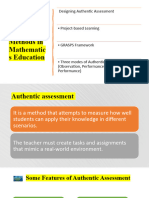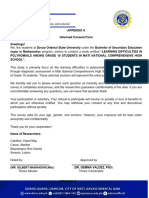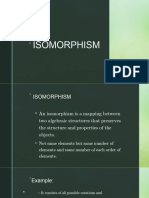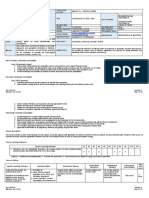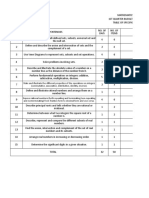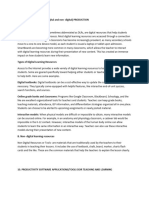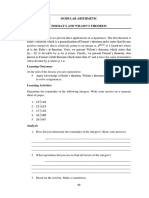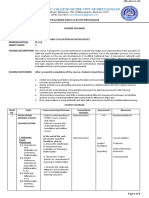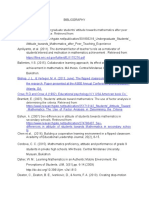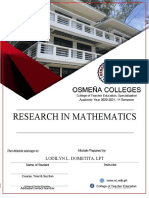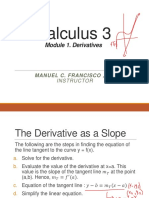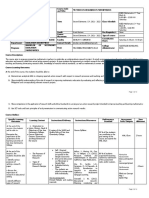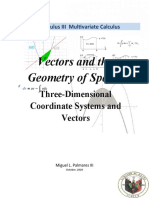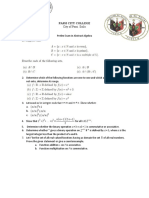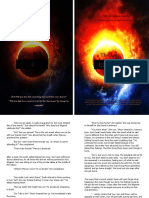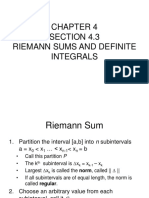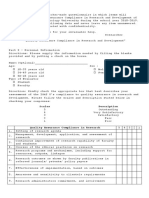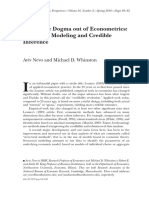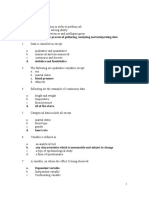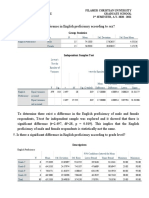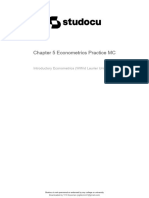PASSI CITY COLLEGE
City of Passi. Iloilo
M A T H 3 1 7 : ACTION RESEARCH IN MATHEMATICS
Module 1:
Introduction to
Educational Research
Miguel L. Palmares III
October, 2020
PASSI CITY COLLEGE
City of Passi. Iloilo
College Vision:
Passi City College- a Center Of Academic Excellence for Sustainable Development and Social
Transformation.
Mission:
Passi City College is committed to produce globally competent graduates who are well
equipped with relevant scientific, academic, and technological knowledge, skills and values which
enable them to become productive citizens and collaborators of social change.
Goals:
1. Provide undergraduate education and training which meet the standard of quality, excellence,
and responsible to regional, national, and international development needs.
2. Broaden the access of deserving and qualified Filipinos to higher opportunities.
3. Enhance the dissemination of knowledge and skill through research, professional and
technological instruction and provide extensive services.
BACHELOR OF SCIENCE IN SECONDARY EDUCATION (MATHEMATICS)
Graduates of the BSED Major in Mathematics degree program is expected to:
a. Exhibit competence in mathematical concepts and procedures
b. Exhibit proficiency in relating mathematics to other curricular areas
c. Manifest meaningful and comprehensive pedagogical content knowledge (PCK) of
mathematics
d. Demonstrate competence in designing, constructing, and utilizing different forms of
assessment in mathematics
e. Demonstrate proficiency in problem-solving by creating routine and non-routine
problems with different levels of complexity
f. Use effectively appropriate approaches, methods, and techniques in teaching
mathematics including technological tools
g. Appreciate mathematics as an opportunity for creative work, moments of discovery,
and gaining insights of the world
Miguel L. Palmares III Page 2
Math 317- ACTION RESEARCH IN MATHEMATICS Module 1
Welcome to Action Research in Mathematics!
Passi City College adopted Blended Learning in response to the restrictions brought by the pandemic to
travel and physical interaction. We will be using modular mode of learning, supplemented by virtual
classrooms, in delivering our topics. This module will serve as the main learning material for this semester.
You are expected to complete the tasks included in this module to pass the subject.
You are expected to complete the tasks included in this module to pass the subject. You will be graded
based on the assessment tasks included in the module and the major exam at the end of the semester.
Further instructions will be given in our messenger chat rooms.
Enjoy the course! 😊
Miguel L. Palmares III, MILE
Instructor
Course Description
This course will develop the prospective mathematics teacher’s knowledge, attitude and skills in
conducting research in teaching and learning secondary school mathematics.
At the end of the course, the students should have:
1. Internalize and discuss the significance of research in addressing issues and concerns about
mathematics teaching and learning in the local secondary schools;
2. Apply the principles of research and research process in conducting educational studies in
mathematics; and
3. Prepare a research report and present a paper.
Miguel L. Palmares III Page 3
Math 317- ACTION RESEARCH IN MATHEMATICS Module 1
Module 1
Overview
In this module, you will be introduced to the definition of educational research, the scientific method
of research. You will also learn the principles of education research and the importance of in Mathematics
education.
Learning Objectives
At the end of this module, the students should have:
Defined educational research
Described the scientific method of research/ research process
Applied principles of educational research
Discussed the importance of research in mathematics education
Course Content: Introduction to Educational Research
1. Sources of knowledge
2. Educational research as scientific inquiry
3. Types of research designs
a. Quantitative
b. Qualitative
c. Analytical
d. Mixed methods
4. Functions of research
5. Research report formats
Activity Description Time to Complete
1. Discuss sources of knowledge 30 minutes
2. Introduce 30 minutes
3. Introduce types of research 30 minutes
4. Discuss functions of research 30 minutes
5. Introduce research report format 30 minutes
6. Assessment 30 minutes
Deadline of the module is on : Friday, October 30, 2020 at 11:59pm
Miguel L. Palmares III Page 4
Math 317- ACTION RESEARCH IN MATHEMATICS Module 1
Sources of Knowledge
All of us frequently make decisions related to our professional lives.
Some decisions are very, very important, others quite trivial
Some decisions are made in very formal, deliberate manners, others quite capriciously
What is the likely basis upon which each of the following questions could be answered?
– What is the best way to relax, today?
– What are we going to do for this year’s Christmas break?
– What are the legal implications of the new IATF policy?
Three legitimate sources for decisions of this nature
Personal experience
Tradition
Authority
Characteristics of these sources
Idiosyncratic
Informal
Subjective in nature
What is the likely basis upon which each of the following questions could be answered?
Will Michael benefit by being held back in the third year next school year?
How many students should be scheduled into Mr. Palmares’s fourth year class?
Does modular learning have an effect upon students’ achievement?
Research is the most legitimate source for questions of this nature.
Definition of Research
Research is a systematic process that is guided by accepted procedures to establish credibility.
Data collection
Data analysis
Interpretation
The systematic, testable, and objective nature of research permits careful examination of the process and
results
Try it Now 1.
Miguel L. Palmares III Page 5
Math 317- ACTION RESEARCH IN MATHEMATICS Module 1
Create at three questions that are answerable by Research.
Research as Scientific Inquiry
Scientific inquiry is the search for knowledge using recognized methods in data collection, analysis, and
interpretation
The purpose of scientific inquiry is to
develop knowledge
Describe phenomena
Examine empirical relationships between or among phenomena
Test whether such relationships are causal in nature
Knowledge is typically presented in the form of theories
– A theory is a set of propositions that explain the relationships among phenomena
– A theory is a means of simplifying and understanding complex realities
Try it Now 2
Search online and briefly describe at least two learning theories.
Educational Research
Two major approaches
– Quantitative
– Qualitative
Differentiating characteristics
Goals
Quantitative: tests theory, establishes facts, shows relationships, predicts, or statistically
describes
Qualitative: develops grounded theory, develops understanding, describes multiple realities,
captures naturally occurring behavior
Research design
Quantitative: highly structured, formal, and specific
Miguel L. Palmares III Page 6
Math 317- ACTION RESEARCH IN MATHEMATICS Module 1
Qualitative: unstructured, flexible, evolving
Participants
Quantitative: many participants representative of the groups from which they were chosen
using probabilistic sampling techniques
Qualitative: few participants chosen using non-probabilistic sampling techniques for specific
characteristics of interest to the researchers
Data, data collection, and data analysis
Quantitative: numerical data collected at specific times from tests or surveys and analyzed
statistically
Qualitative: narrative data collected over a long period of time from observations and
interviews and analyzed using interpretive techniques
Researcher’s role
Quantitative: detached, objective observers of events
Qualitative: participant observers reporting participant’s perspectives understood only after
developing long-term, close, trusting relationships with participants
Context
Quantitative: manipulated and controlled settings
Qualitative: naturalistic settings
Try it Now 3
Create a table comparing quantitative and Qualitative research.
R e s e a rc h D e s ig n s
Q u a n ti ta tiv e Q u a li t a t i v e A n a ly t i c a l S t u d y M i x e d M e th o d
C a s e S tu d y C o n c e p t A n a ly s i s
N o n - E x p e r im e n ta l E x p e r im e n ta l
Types of Research Designs P h e n o m e n a o lo g y H i s t o r i c a l A n a ly s i s
D e s c rip tiv e T ru e E th n o g r a p h y
C o m p a ra tiv e Q uasi G ro u n d e d T h e o ry
Miguel L. Palmares III Page 7
Math 317-C ACTION
o r r e la t i o n RESEARCH
al S i n g l e S u b je c t
IN MATHEMATICS Module 1
C a u s a l C o m p a r a ti v e
Quantitative Designs
Two major categories
– Experimental
The investigation of causal effects through direct manipulation of an independent
variable and control of extraneous variables
– Non-experimental
The investigation of the current state of a variable or the relationships, other than
causal, between variables
An example of an experimental design
– Randomly assign students to one of two classrooms in which the same social studies unit is
being taught. Teach the first class using the traditional lecture approach, the second class using
co-operative learning groups. Examine the achievement differences between the two groups to
see if the type of “approach” to instruction had an effect.
– This study is characterized by the investigation of cause (instructional approach) and effect
(achievement), manipulation (choice of instructional approach), and control (same unit being
taught, random assignment, etc.)
Differentiating the three types of experimental designs
Miguel L. Palmares III Page 8
Math 317- ACTION RESEARCH IN MATHEMATICS Module 1
– True experimental
Random assignment of subjects to groups
– Quasi-experimental
Non-random assignment of subjects to groups
– Single subject
Non-random selection of a single subject
Examples of non-experimental designs
– Approximately 10% of Iloilo’s public school students do not finish high school.
– The GPA of students participating in extra-curricular activities is higher than that of student who
do not participate
– Student attitude is moderately related to achievement
– Several factors are related to the high dropout rate in Iloilo. These include the student’s age,
academic record, repetition of grade(s), gender, and ethnicity.
– These studies are characterized by descriptions (dropout rate, GPA differences, opinions) or
relationships (attitudes and achievement, factors related to dropping out)
Differentiating the four types of non-experimental designs
– Descriptive
Makes careful descriptions of the current situation or status of a variable(s) of interest
– Comparative
Compares two or more groups on some variable of interest
– Correlational
Establishes a relationship (i.e., non-causal) between or among variables
– Ex-post-facto
Explores possible causes and effects among variables that cannot be manipulated by the researcher
Qualitative Designs
Much less precision in the definitions of and distinctions between qualitative designs in comparison to
quantitative designs
Miguel L. Palmares III Page 9
Math 317- ACTION RESEARCH IN MATHEMATICS Module 1
Four major categories of designs
Case study
Phenomenology
Ethnography
Grounded theory
Case Study
– An examination of a specific instance of a phenomena in its natural context viewed from the
perspective of the participants
This study explored the meaning of “inclusion” for three disabled students who had
been placed in a regular education setting.
This study examines in-depth a phenomena of interest to the researcher (i.e., the
meaning of inclusion) in a natural context viewing it from the participant’s perspectives
Phenomenology
– A description of the meaning of an experience
The purpose of this study was to examine the meaning of being “left out” for an
adolescent
This study examines in-depth the experiences of being “left out” from the perspectives
of the adolescent experiencing this phenomena
Ethnography
– A description the beliefs and practices of a cultural or social group or system
The purpose of this study was to identify and describe the conflicts that experienced
second-grade teachers encountered as they switched from a traditional approach to
teaching mathematics to a constructivist-sociological approach
This study examines the beliefs and practices of second grade teachers experiencing a
common phenomena related to their approach to teaching
Grounded theory
– A description of a conceptual understanding of a particular phenomenon
Miguel L. Palmares III Page 10
Math 317- ACTION RESEARCH IN MATHEMATICS Module 1
The purpose of this study was to understand the relationship of the bar to the teachers
who frequented it on Friday evenings. We found that teachers used the bar to facilitate
their movement from “professional” to “personal” self.
This study examined a phenomena of interest to the researcher (i.e., teachers
congregating at a particular bar on Friday evenings) and developed a conceptual
understanding of it.
Analytical Designs
Analytical Designs are descriptions of historical, legal, or policy issues through an analysis of
documents, oral histories, and relics.
Two basic approaches
– Concept analysis – the study of educational concepts (e.g., co-operative learning, leadership,
etc.) to describe the different meanings and the uses of the concept
– Historical analysis – the systematic collection and criticism of documents that describe past
events of relevance to education
An example of a concept analysis
– The purpose of this study is to examine the meanings and uses of the term standards-based
curriculum.
– This study examined the varied meanings, interpretations, and uses of an important curricular
concept.
An example of an historical analysis
– The purpose of this study is to examine the changes in standardized testing over the last 40
years.
– This study addresses the historical developments characterizing the use of standardized tests
over a 40 year period.
Mixed Method Designs
Mixed Methods Design is the use of quantitative and qualitative designs and methods within a single
study. It allows the researcher to better match the approach to gathering and analyzing data to the research
questions. The relative emphasis given to any particular method varies widely. It is a systematic investigation
Miguel L. Palmares III Page 11
Math 317- ACTION RESEARCH IN MATHEMATICS Module 1
that gives emphasis on teachers, counselors, and administrators and brings together characteristics of
systematic inquiry and practice.
Four Functions of Research
Basic: research designed to test or refine theory
Applied: research conducted in a field of common practice and concerned with the application and
development of research based knowledge
Action: research designed to solve a specific classroom or school problem, improve practice, or make a
decision at a single local site
Evaluation: research designed to assess the merit and worth or a specific practice in terms of the
values operating at a site
Educational Report Formats
Title and author
Abstract
Introduction
– Quantitative: specific research questions
– Qualitative: general problem statement
Review of the literature
– Quantitative: extensive
– Qualitative: brief
Research problem statement or questions
– Quantitative: specific, narrow questions and hypotheses
– Qualitative: general, foreshadowed questions
Method and design
– Quantitative: participants, instruments, and procedures
– Qualitative: participants and settings/sites
Results
– Quantitative: statistical explanations
Miguel L. Palmares III Page 12
Math 317- ACTION RESEARCH IN MATHEMATICS Module 1
– Qualitative: narrative descriptions
Discussion
Conclusions
References
Try it Now 4
Chose a Research Design for the three research problems you have created in “Try it Now 1.”
Summary of Topics
1. Sources of Knowledge
2. Definition of Research
3. Research as Scientific Inquiry
4. Educational Research
5. Types of Research Designs
6. Quantitative Designs
7. Differentiating the three types of experimental designs
8. Differentiating the four types of non-experimental designs
9. Qualitative Designs
10. Analytical Designs
11. Mixed Method Designs
12. Four Functions of Research
13. Educational Report Formats
Assessment
I. Identification. Write the word/phrase described by the following statements.
1. It is a systematic process that is guided by accepted procedures to establish credibility.
2. It is the search for knowledge using recognized methods in data collection, analysis, and interpretation.
3. It is a set of propositions that explain the relationships among phenomena.
4. It is an educational research approach that tests theory, establishes facts, shows relationships,
predicts, or statistically describes.
5. It is an unstructured, flexible, and evolving research approach
6. A research design that uses both quantitative and qualitative approach in one study.
7. It is a quantitative research design that investigates causal effects through direct manipulation of an
independent variable and control of extraneous variables.
8. This study is characterized by the investigation of cause (instructional approach) and effect
(achievement), manipulation (choice of instructional approach), and control (same unit being taught,
random assignment, etc.)
Miguel L. Palmares III Page 13
Math 317- ACTION RESEARCH IN MATHEMATICS Module 1
9. An examination of a specific instance of a phenomena in its natural context viewed from the
perspective of the participants
10. This study examines in-depth the experiences of being “left out” from the perspectives of the
adolescent experiencing this phenomena
II. Multiple Choice. Choose the letter of the best answer.
1. An investigator wishes to determine how much coverage current high school history texts give to
the contributions of Aetas our history. She should conduct:
a. historical research
b. case studies
c. content analysis
d. experimental research
2. Mixed-method research refers to use of both:
a. Experimental and correlational methods
b. Quantitative and qualitative methods
c. Description and intervention
d. Group and single subject designs
3. Which of the following factors should not influence the decision when one is selecting a topic or problem for
research?
a. Will solution of the problem advance knowledge in my field?
b. Will I be able to prove that my previously held beliefs are true?
c. Will the study lead to the development of other investigations?
d. Is the topic or problem amenable to research?
4. Which of the following statements can be checked by means of scientific inquiry?
a. All high schools should teach driver education.
b. Driver education is more important than drug abuse education.
c. Driver education is an ideal subject for all students to take.
d. The accident rate of driver education graduates is lower than the accident rate of those who have
not had driver education.
5. Which of the following is a form of research typically conducted by teachers, counselors, and other
professionals to answer questions they have and to specifically help them solve local problems?
a. action research
b. basic research
c. predictive research
d. orientational research
6. A description of the beliefs and practices of a cultural or social group or system
a. Case tudy
b. Ethnography
c. Phenomenology
d. Grounded theory
7. A description of a conceptual understanding of a particular phenomenon
a. Case Study
b. Ethnography
Miguel L. Palmares III Page 14
Math 317- ACTION RESEARCH IN MATHEMATICS Module 1
c. Phenomenology
d. Grounded theory
8. The investigation of causal effects through direct manipulation of an independent variable and control of
extraneous variables.
a. Experimental
b. Ethnography
c. Non-experimental
d. Grounded theory
9. A non-experimental design that compares two or more groups on some variable of interest.
a. Descriptive
b. Comparative
c. Correlational
d. Ex-post-facto
10. It explores possible causes and effects among variables that cannot be manipulated by the researcher.
a. Descriptive
b. Comparative
c. Correlational
d. Ex-post-facto
Note: You can answer your “Try it Now” and Assessment tasks through this link.
https://forms.gle/73esZdJ5jvtNbuf59. Answers on the “Try it Now” tasks can be uploaded through the link.
References
Cohen, L., Manion, L., & Morrison, K., (200). Research methods in education, 6 th ed. New York: Routledge.
Anderson, G., (1998). Fundamentals of educational research. Penssylvania: Falmer Press.
Creswell, J.W. (2012). Educational research:Planning, conducting, and evaluating quantitative and qualitative
research, the d. Boston, MA: Pearson.
UNESCO. (2005). Educational research: Some basic concepts and terminology. France: International Institute
for Educational Planning/UNESCO.
“The best way to predict your future is to create it.”
-Abraham Lincoln
Miguel L. Palmares III Page 15
Math 317- ACTION RESEARCH IN MATHEMATICS Module 1
Miguel L. Palmares III Page 16
Math 317- ACTION RESEARCH IN MATHEMATICS Module 1


